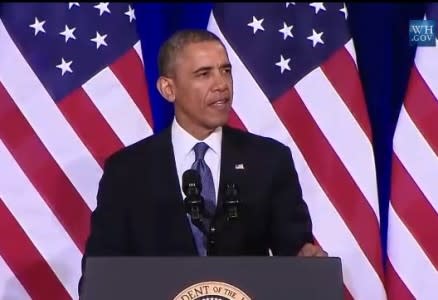The Constitution Outside the Courts: President Obama
Many Americans, not just the courts, help shape the meaning of the Constitution in the nation’s life. This series explains the actual or potential contributions of these other individuals, groups, or institutions. Today’s Constitution-maker is President Obama. In his State of the Union message last week, the President declared a measure of independence from Congress, saying that he would not wait for the legislative process to take action that he believed was necessary.
The Constitution lays upon the president a profoundly important duty, but it does not spell out how the nation’s chief executive is to perform it. Presidents from George Washington on, and without exception, have often chosen to act on their own to carry out the command of Article II, Section 3, that the occupant of that office “shall take care that the laws be faithfully executed.”
That can be read, of course, to mean that when Congress passes a law, using its undoubted authority to make laws for the nation’s governance, the president is to adhere to the letter of what Congress has enacted, and not to deviate from it. Faithful thus can mean respectful, and maybe even obedient.
But even that reading probably misunderstands the design of a working government: Congress may pass a law that the president decides is unconstitutional; what then? Hasn’t he taken an oath to defend the Constitution? Congress may pass a law that, because of the compromises that went into its passage, is not really clear and specific; what then? Don’t government bureaucrats need some guidance sometimes? And what is the president to do if he sees the need for government to act, but Congress has not enacted a law to show the way? Must he do nothing with his own executive power?
President Obama, in his State of the Union message on January 28, proclaimed: “Wherever and whenever I can take steps without legislation to expand opportunity for more American families, that’s what I’m going to do.” Predictably, he got a good deal of criticism for that promise. Typical was a comment by a member of the Senate from South Carolina, Republican Tim Scott: “To the extent that he continues to move unilaterally without the consent of Congress, I think it doesn’t sit well with a message of unity.”
It is no surprise, and it is not at all unusual historically, for a president to come to the conclusion that he does not always have to get “the consent of Congress.” Take, for example, the power of the president to issue a formal “Executive Order,” which has all the force of enacted law. George Washington issued eight of those, setting an initial precedent for “unilateral” executive action; Franklin Roosevelt still holds the record – 3,522. Barack Obama has issued 168.
One of the most famous Executive Orders of modern times was issued by President Harry Truman in 1952. That was during the Korean war, and Truman acted to keep the steel mills operating in the face of a labor union strike.
But presidents can take such bold measures only at the risk that the Constitution might override what they have done. Truman’s steel mill seizure, indeed, was struck down by the Supreme Court in perhaps the strongest constitutional rebuff of any presidential action.
President George W. Bush, who in his time heard a lot of criticism of his defense of the power of what was called the “unitary executive,” also was faced down by the Supreme Court in 2006 when it overturned his Executive Order to create a system of military courts to try suspected war criminals after the 9/11 terrorist attacks on the U.S.
So far, in the short time since President Obama spoke of his plan to go it alone, he has done nothing as bold as Truman or the second Bush did in those particular orders. He has imposed a $10.10 minimum wage guarantee on private businesses that obtain new government contracts, has taken steps to create a new kind of retirement account for people with only modest incomes, and has moved to set up some jobs-generating business initiatives.
Obama may yet face a veto-of-sorts from the Supreme Court on one of his initiatives to try to get around legislative gridlock: his appointments to government boards during a time when the Senate was in recess, after refusing to vote on those nominees. That case still awaits a decision from the Justices.
Presidents thus are not above the law in any meaningful sense. And, whether their unilateral actions are bold and adventuresome, or narrow and incremental, they can send a significant political message to Congress and to the country. A presidential declaration not to stand idly by is not necessarily an act of defiance, but an invitation to a partnership.
Announcing a self-executing decision can be, depending upon how it is received in the halls of Congress, an opening gesture toward a policymaking conversation. In the last couple of years, President Obama has not had a real partner in Congress, and there have not been a lot of policymaking conversations that went anywhere.
Still, with more than two years to go in his second term, Obama has chosen to adopt a more activist posture, and thus is bidding to become anew a Constitution maker, reminding Congress about that important language in Article II, Section 3.
Lyle Denniston is the National Constitution Center’s adviser on constitutional literacy. He has reported on the Supreme Court for 55 years, currently covering it for SCOTUSblog, an online clearinghouse of information about the Supreme Court’s work.
Recent Constitution Daily Stories
Video: The Fourth Amendment yesterday, today and tomorrow
The man who wrote the words “We The People”


